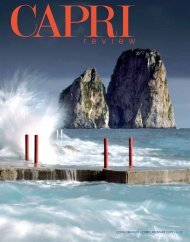COPIA OMAGGIO ⢠COMPLIMENTARY COPY EDIZIONI PRC
COPIA OMAGGIO ⢠COMPLIMENTARY COPY EDIZIONI PRC
COPIA OMAGGIO ⢠COMPLIMENTARY COPY EDIZIONI PRC
Create successful ePaper yourself
Turn your PDF publications into a flip-book with our unique Google optimized e-Paper software.
[Personaggi]<br />
M. MASTRORILLO<br />
nuotata, amava farsi massaggiare da Glauco<br />
Di Bella, un bel giovane di origine siciliana<br />
che aveva imparato l’arte del massaggio a<br />
Roma e a Capri aveva messo su bottega. A<br />
lui lo scrittore aveva rilasciato una dedica<br />
molto affettuosa che teneva in bella mostra<br />
nel suo locale: «Per Glauco Di Bella, il cui<br />
nome rappresenta così bene la sua isola di<br />
Capri - glauca come il colore degli occhi di<br />
Minerva, e bella come le rocce immortali di<br />
questo luogo… e come lui».<br />
L’esule di Capri, scaturì naturalmente dalla<br />
sua penna felice e fu pubblicato nel 1959,<br />
con una introduzione di Jean Cocteau che si<br />
augurava che il libro «servisse alla gioventù<br />
per capire che la bellezza esteriore non può<br />
esistere se non controbilanciata e se la sua<br />
protervia non è esorcizzata da una bellezza<br />
interiore e da un duro lavoro; e che la<br />
giovinezza è un privilegio effimero, e non<br />
l’attributo di una forte razza contrapposta<br />
alla razza decadente dei vecchi».<br />
Il romanzo oltre a raccontare la vita tumultuosa<br />
dell’erede di industriali tedeschi,<br />
elenca fatti e pettegolezzi storici sull’omosessualità<br />
maschile, facendone quasi un<br />
manuale. Fu proprio Peyrefitte a riscoprire<br />
e a dare dignità di racconto a quelli che<br />
fino ad allora erano solo dei pettegolezzi di<br />
paese, raccontando la tragedia umana del<br />
conte. Ne era uscito un romanzo assolutamente<br />
convincente e ricco di fascino, al<br />
punto da creare un vero mito di Fersen.<br />
Anzi il paradosso è che Fersen, è stato<br />
scritto, grazie a questo romanzo, ha infine<br />
ottenuto, come personaggio letterario,<br />
quella fama che come autore non riuscì<br />
mai a raggiungere.<br />
Peyrefitte muore a Parigi il 5 novembre del<br />
2000, a 93 anni, e a Villa Lysis una lapide<br />
così lo ricorda: «A Roger Peyrefitte autore<br />
de L’esule di Capri per aver esaltato e diffuso<br />
il mito, la cultura e la bellezza dell’isola<br />
nel mondo».<br />
<br />
Capri: blue-green (glauco in Italian) like the<br />
colour of Minerva’s eyes, and beautiful like the<br />
timeless rocks you find here, as stunning as<br />
Glauco himself.”<br />
L’Exile de Capri, which freely flowed from<br />
the writer’s pen during these halcyon days,<br />
was published in 1959, with an introduction<br />
by Jean Cocteau, who expressed his desire<br />
that the book “would help young people<br />
understand that outer beauty could not<br />
exist - not could its insolence be exorcized<br />
- if not offset by inner beauty combined<br />
with discipline; and that youth is a passing<br />
privilege, not the attribute of a hardy race,<br />
against the decadent race of old people.”<br />
The novel does more than retell the<br />
tumultuous existence of the heir to the<br />
German industrialists’ fortune; it details<br />
historical fact and legend on the subject<br />
of male homosexuality, and can virtually<br />
be read as a manual. And it is thanks to<br />
Peyrefitte if what had just been island<br />
gossip was rediscovered and dignified<br />
with a narrative, one that retold the human<br />
tragedy of Count Fersen. The result was a<br />
compelling and wholly convincing work that<br />
itself was responsible for creating Fersen’s<br />
myth. Indeed, it has been observed that,<br />
paradoxically, Fersen owed his fame as a<br />
literary figure to this very novel, never having<br />
achieved it as a novelist himself.<br />
Peyrefitte died in Paris on 5 November 2000,<br />
at the age of 93, and a plaque at Villa Lysis<br />
remembers him thus: “To Roger Peyrefitte,<br />
author of L’Exile de Capri, who extolled and<br />
diffused the myth of Capri throughout the<br />
world, along with its culture and beauty.” <br />
98



